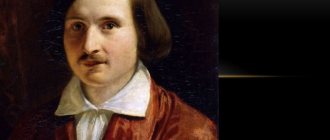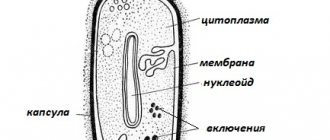Introduction to Nikolai Vasilyevich Gogol's comedy “The Inspector General” Literature lesson. 8th grade. - presentation
Introduction to Nikolai Vasilyevich Gogol’s comedy “The Inspector General” Literature lesson, 8th grade
Educational: to instill interest in Russian classical literature, to introduce the stage history of N.V. Gogol’s comedy “The Inspector General” and the features of a literary work intended for the theater (play). Developmental: develop the analytical skills of students, expand knowledge about drama, trace the connection between literature and painting. Educational: to form positive moral orientations, to cultivate interest in the writer’s works. The purpose of the lesson:
“There is no point in blaming the mirror if your face is crooked” Proverb
“Petersburg is a great lover of theatre. If you are walking along Nevsky Prospekt on a fresh frosty morning... go into the vestibule of the Alexandrinsky Theater at this time,” wrote N.V. Gogol Petersburg. Nevsky Avenue.
Types of literature Lyrics Drama Epic
The history of the creation of the play On Sunday, April 19, 1836, at the Alexandria Theater for the first time, an original comedy (that is, not translated, finally!) a comedy in 5 acts “The Inspector General,” written by N. Gogol
1. Pushkin told Gogol several versions of a “vagrant” joke about an imaginary auditor in the provinces. 2. Stories about imaginary auditors were known to Gogol from other sources. Gogol himself and his friends from the gymnasium acted out these skits at the stations in front of the wardens and received horses. 3. There were other works with a similar plot. For example, “A Visitor from the Capital, or Turmoil in a District Town” by Kvitka-Osnovyanenko. The resemblance is purely external. This is vaudeville. 4. Russian life also suggested plots. The fear of audits (every three years) and auditors lived constantly among officials. 5. Historical painting by K. Bryullov “The Last Day of Pompeii”. Events that influenced the creation of the comedy
“The Inspector General” is a whole sea of fear. Yu. Mann
Gogol read as hardly anyone can read. It was the height of amazing perfection. M.P. Pogodin
“The theater is not at all a trifle and not at all an empty thing... This is a pulpit from which you can say a lot of good to the world” N.V. Gogol
Anton Antonovich Skvoznik-Dmukhanovsky - mayor. Anna Andreevna - his wife
Luka Lukich Khlopov - superintendent of schools Ammos Fedorovich Lyapkin-Lyapkin - judge
Artemy Filippovich Strawberry - trustee of charitable institutions Ivan Kuzmich Shpekin - postmaster
Bobchinsky and Dobchinsky Ivan Alekseevich Khlestakov
On May 17 we watched The Inspector General. The mayor was played by Shchepkin for the first time upon his arrival from St. Petersburg, in which he left a living memory. The role of the mayor in Moscow was vulgarized during his absence, and the more impatiently we wanted to see it again, performed by a great artist. And how he accomplished it! No, I've never done it like that before!
The Tsar laughed and applauded a lot at the comedy performance, probably wanting to emphasize that the comedy was harmless and should not be taken seriously. He understood perfectly well that his anger would be another confirmation of the veracity of Gogol’s satire. By publicly expressing royal complacency, Nicholas I wanted to weaken the public sound of The Inspector General. However, left alone with his retinue, the tsar could not stand the cunningly conceived role to the end and burst out: “What a play! Everyone got it, and I got it the most!”
Homework: Read Act I and briefly retell. I wish you creative success!
Download material
so UNT / Russian literature / Lesson plans for Russian literature 8th grade
Lesson 33 “AUDITOR”: FIRST AND SECOND ACTIONS. KHLESTAKOV AND “MIRANGE INTRIGE” (YU. MANN)
25.01.2013 35445 2896
Lesson 33 “AUDITOR”: FIRST AND SECOND ACTIONS. KHLESTAKOV AND “MIRANGE INTRIGE” (YU. MANN)
Lesson objectives:
introduce, comment and discuss the events and characters of acts I and II of the comedy; start working on drawing up a quotation plan; work on expressive reading by role.
During the classes
I. Organizational moment.
II. Checking homework.
1. Experiments in oral compositions (individual assignment).
– How did you feel creating your own work about the theater - or more precisely, about yourself in the theater?
– What was achieved relatively easily (if, of course, it was possible)?
- What caused the pain? Did you manage to overcome them?
2. Review of the first experiences of theatrical essays (reflections, free thoughts, as if alone with oneself).
– What, undoubtedly, have today’s authors succeeded in?
– What hasn’t worked out yet?
3. Retelling of an article from the textbook “On the concept, production and writing of the “auditor”.
III. Work on a new topic.
1. The teacher's word.
So, isn’t it time for us to make a stop in the city where Skvoznik-Dmukhanovsky rules, and justice is administered by Lyapkin-Tyapkin, in company with policemen Ukhovertov, Svistunov and Derzhimorda, where Artemy Filippovich Strawberry is in charge of the hospitals, and the district doctor Christian Ivanovich Gibner heals the sick...
So, "The Inspector". Comedy in five acts.
“There is no point in blaming the mirror, / if the face is crooked.” Popular proverb.
- What kind of auditor does an auditor have to be to end up in a comedy? And what kind of auditor is he after that?
And then there’s the epigraph: “There’s no point in blaming the mirror...”
Remember the epigraph to Pushkin’s “The Captain’s Daughter,” which also opens with a folk proverb. In Pushkin it is inviting and pathetic: “Take care of your honor from a young age,” in Gogol it is provoking and mocking: “mirror” and “face” reflected in it!
Not a single playwright has opened a play like this: so that nothing seems to have happened in it, but at the same time almost “everything” has already happened, happened, and this “everything” is the mood of the reader-spectator: he cannot help laughing at such a “mirror” and such a “face”.
Let's try to imagine what the “city fathers” would look like in your performance.
2. Reading by roles (I act, phenomenon 1).
3. Conversation about what you read.
– Who and how is depicted in Gogol? Such important and respectable “city fathers,” and suddenly only a few timid, incoherent words were able to utter, as if speechless: “How’s the auditor?” How pathetic and ridiculous this fear of officials is!
– What lines of Gogol’s characters in “The Inspector General” were immediately remembered and seemed especially successful and expressive? (“Like an auditor?”, “Here you go!”, “You’re not that, you’re not...”, about “sins,” about “war.”)
– How were these assumptions about the reason for the unexpected visit of the auditor met? (Of course, this is funny, stupid. But they are important, with knowledge of the matter, doing their best! Why? Yes, everyone wants to seem smarter and more knowledgeable than the other: well, isn’t it Bobchinsky and Dobchinsky?!)
“But it all started with basic fear.” Do Gogol's officials, and even the atmosphere of Act 1, change?
Let us recall once again the mayor’s verbosity and the ornateness of his first phrase, which opened Gogol’s comedy “I invited you...”. He is official and significant, there is even some kind of solemnity in his tone and words, in the complexity of the phrase. Is it possible to suspect the mayor of cowardice based on this phrase (“unpleasant news: an auditor is coming to see us”), based on the way it was pronounced? No way! Although he, as a “smart person”, will not miss what “floats into his hands” and his “sins”!.. But with what dignity does he carry himself, while instilling fear in the officials? How did he do this? Please note that the mayor does not immediately inform the officials of the “unpleasant news”, but gradually, keeping silent about the most unpleasant and dangerous for now: having prepared his colleagues for the upcoming troubles and having heard their first perplexed questions, he reports the most alarming detail calmly, as if nothing had happened : “Inspector from St. Petersburg, incognito. And with a secret order."
How brilliantly Gogol “...starts” the comedy and constructs dialogues and individual lines, how important even subtle details are for him, right down to a single word or punctuation. This is how you should read Gogol, taking in the details of genius.
While reading, we not only hear, but also see any Gogol character. How? Whereby?
– Let us turn again to the text, to the episode of the mayor’s reading the letter: “Dear friend, godfather and virtue (mutters in an undertone, quickly running his eyes... significantly raises his finger up).”
But Christian Ivanovich Gibner: makes a sound somewhat similar to the letter “i” and somewhat similar to “e”.
– So we discovered another secret of the play: even a dramatic work cannot do without the author’s word. Remarque
- a kind of hint to the actor. “The Inspector General” is simply replete with remarks! They are very laconic, not syntactically related to the text and are not pronounced, but are only read in order to be played, and are enclosed in parentheses in the text of the play.
4. The first stage test of the comedy and its background.
– And now I would like to invite you to look at Gogol’s comedy through the eyes of the author: did he foresee how his contemporaries would greet his “The Government Inspector”?
Imagine: in the Maly Theater at the first performance of “The Inspector General” - not a single laugh (!), in the role of the mayor - the public’s favorite, the famous Mikhail Semenovich Shchepkin, and - deathly silence from the audience. The author rushes around behind the scenes, convinced that his comedy has failed. And as soon as, at the end of the 1st act, Shchepkin, who had not yet cooled off from the role, appeared before Gogol, the writer, almost crying, asked him: “Is it really a failure?” The actor responded with bewilderment: “Where did you get the idea, Nikolai Vasilyevich?” - “But no one laughed!” - Gogol said in confusion. “Yes, we didn’t laugh,” Shchepkin agreed, smiling. - so what? And how could they laugh if those sitting below are those who take bribes, and at the top (balcony, gallery, cheaper tickets) are those who give them.”
The events in Gogol's comedy are so natural, believable, they are so everyday that one involuntarily wants to know: did such a case with officials who were deceived about the auditor really happen or did Gogol come up with it all?
Student's story about the history of comedy (homework).
Teacher's word.
Yes, Pushkin prompted Gogol to create “The Inspector General” by telling him a story that happened in a provincial town with his friend; It’s not difficult to imagine it from Gogol’s comedy, but Khlestakov has nothing to do with it. After all, finding himself in Khlestakov’s place, Pushkin’s friend behaved completely differently than Gogol’s hero: he hastened to leave the overly hospitable city, to escape from the embrace of hospitable officials.
Having given the plot to Gogol, Pushkin dreamed that his future creation would become a real holiday of laughter. With his comedy, Gogol ridiculed what we had become accustomed to for centuries, he ridiculed the familiar!
And again scenes from a comedy come to mind.
Recreation in an emotional and playful retelling
scenes of an argument between the mayor and the judge about the fact that each of them takes bribes.
Teacher's conclusion.
Pay attention to how persistent the judge is in his ideas about bribery, especially since he professes quite original views, which, like the rest of his views, “he arrived at on his own, with his own mind.”
But behind every bribe there is a person, the one to whom it is given, and Gogol’s comedy amazes with the large number of bribe takers!
The playwright reduced the bribe to comic absurdity, since bribe takers are absurd, insignificant, and ridiculous. So why do they please such a nonentity, a wicked little thing, Khlestakov, with bribes?
Because he is an important thing in the capital, which the officials did not doubt for a moment, an “auditor”, “and incognito”, and, moreover, “with a secret order”!
And gentlemen officials cannot, do not want to deprive themselves of the trade to which they are accustomed and which feeds them more than the civil service - to deprive themselves of a bribe!
What is going on in the city, why is a bribe so necessary?
How to present the city that the auditor is to examine?
Gogol coped with this task brilliantly: his characters suddenly started talking with all their might, and their chatter immediately transports the reader to different “institutions” of the city - be it a court, a hospital or an “educational institution.”
5. Monologue statements by students about the court, hospital, school.
6. Analysis of Act II.
Teacher's word.
In Gogol’s “The Inspector General,” no matter what the new scene, there is certainly a climax!
Why are the officials and the city so funny? Just because it is impenetrably stupid, this city, however, does not doubt its “learning” and “wisdom”! That is why the mayor, the judge, Zemlyanika, and even the almost speechless Luka Lukich Khlopov are so fond of launching into thoughtful discussions. This is probably why the scene where Dobchinsky and Bobchinsky warm up the officials with their “version” about the mysterious “incognito” from St. Petersburg is so hilarious.
Gogol’s brilliant move: he put us, readers and viewers, in a position more advantageous than the one in which, by his own authorial will, the characters are: we know who Khlestakov is, but the mayor has “damned incognito” on his mind, and Almost a farce is playing out before us. Khlestakov and the mayor instill fear in each other, competing in both fear and servility. After all, they cannot understand each other, they resist, fight off each other - well, Khlestakov does not want to move to a new apartment, and the mayor pins all his hopes for mutual understanding with the auditor only on this.
7. Reading by roles (Act II, phenomenon 8).
– What do they agree on? On a bribe! She, damn it, made them related.
And then, between four walls, without witnesses (as it should be according to the “laws” of bribery), a bribe, and, of course, larger than requested, obviously “in debt,” their Excellency “screwed” Strawberry to Khlestakov, repeating the mayor ...
A significant event has happened: those who are accustomed to taking bribes are now just as accustomed to giving them! By the will of Gogol, the bribe-taker turned into a bribe-giver!
You have to stoop so low as to fork out for it yourself, and how!
IV. Summing up the lesson.
– Don’t you remember the beginning of the stage history of “The Inspector General”? yes, Shchepkin’s explanation: why the audience didn’t laugh.
Gogol's comedy introduces a significant clarification into the thought of the great actor: if the audience was divided into those who take and those who give bribes, then Gogol's comedy united them: and those who take inevitably become givers! It is not so important whether the bureaucratic spectators of Gogol’s comedy experienced this on their own skin or were dismayed by the prospect that the writer suddenly opened up for them, turning an important person into a “fiend” - the opposite of what Khlestakov tried to do to himself: their reputation as Gogol’s laughter dealt an irreparable blow!
Homework:
prepare an expressive reading based on the roles of Act III; Continue drawing up the quotation plan.
See the downloadable file for the full text of the material.
The page contains only a fragment of the material.
lesson plans, 8th grade, Russian literature


